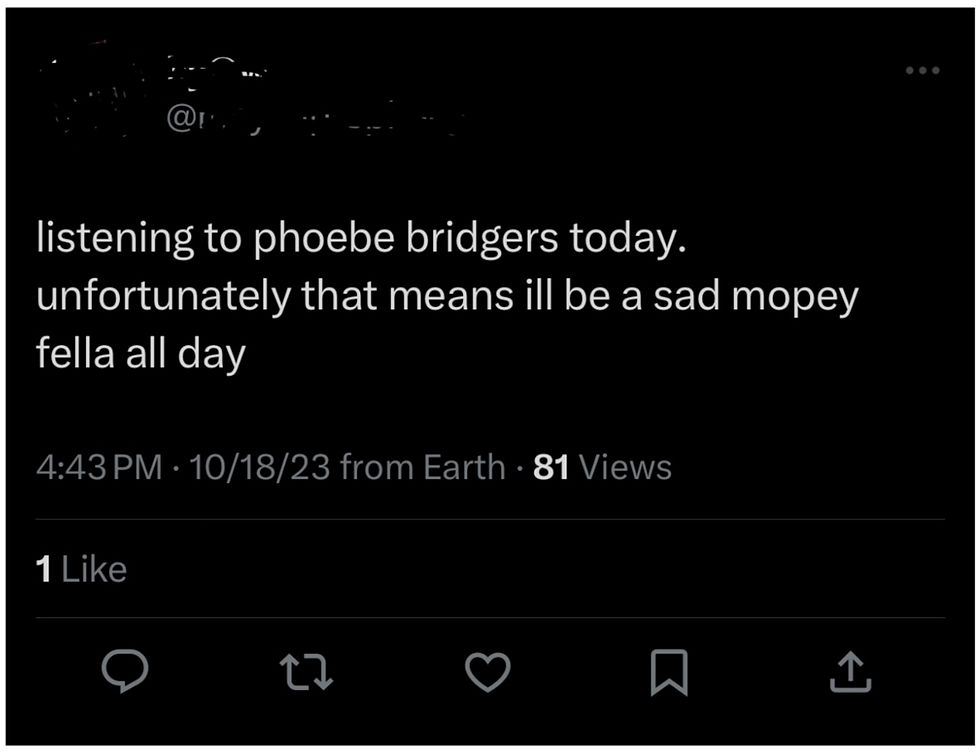Phoebe Bridgers is more than sad girl music
- Savannah Gentry
- Nov 3, 2023
- 3 min read
I remember 2020 as if it was yesterday which is painful but also makes me grateful for all I have discovered and learned since then. One of the biggest staples for me in 2020 was that I started listening to Phoebe Bridgers. Originally, I began listening to her debut album, Stranger in the Alps (2017), because it helped me focus when I was trying to do homework or calm down when I got stressed out about my junior year of high school being completely online. As I continued listening to Bridgers I found this popular discourse surrounding her music. It was stapled as “sad girl music.” At the time I began listening to Bridgers I might have agreed with the many Twitter (I’m not calling it that other thing) users who simply delighted themselves into forcing this music into a box; however, I find that we don’t do this with men’s music.
Some examples of this narrative online are these two tweets I found out of a sea similar to them. I don’t think Twitter is the most reliable source, however, I am talking about how Bridgers is perceived by the general public or even those who listen to her, so I’m not going to turn to something like Rolling Stone Magazine to show you examples of this narrative. Although, I’m sure it exists in magazines and other outlets as well.


Bridgers has plenty of songs that I wouldn’t classify as sad more so as evocative. Evoking emotions doesn’t equate to sadness but it is easy to stereotype a woman as only being able to write one type of music and believe she is somehow “lucky” that she is good at it. The discourse around Bridgers reminds me of that with Mary Bradstreet, an early Puritan Poet in colonial America. Bradstreet was criticized that she was only lucky to have written good poems. She was accused that someone else was writing them or that she was copying men. This happened in the 1600s and yet I still see patterns similar to the way Bridgers is treated today.
Because everything must come back to men in our patriarchal society, there was heavy discourse around Paul Mescal, Bridgers’ ex-boyfriend. As someone who has no investment in this and nothing to gain I must say y’all are weird to speculate over a strangers breakup, slutshame the artist you “support,” hope that new music comes out because of it, and last but not least do the exact same thing to her new relationship. It’s weird. You are weird. No one owes you anything about their personal life and you do not need to go on Twitter to get your parasocial fix. That’s all I want to say about that.
Coming around to the topic on hand again I feel as if Bridgers music is stereotyped as “sad” because what else can a woman be but emotional? When people mention that they listen to artists such as The Smiths, Elliott Smith, Harry Styles, Noah Kahan, Radiohead, (have y’all even listened to Fake Plastic Trees?), and more male artists who have many sad songs on their discography they are not stereotyped as making “sad boy music”. They only make music. This discourse surrounding “sad girl music” has been forced onto other female artists such as Lana Del Ray, Mitski, Gracie Abrams, Fiona Apple, etc… this is not only sad music! This is simply music! Music can be evocative of emotions and not be sad.
When I listen to Phoebe Bridgers sometimes I feel sad and other times I feel really really really really really good. I love listening to Kyoto, it makes me feel angry. When I listen to Chinese Satellite I reflect on my religious upbringing and how I also feel confused about if there is a God out there. When I listen to I Know the End I feel grateful that endings don’t always have to be bad, they can be powerful, they can be beautiful. When I listen to Motion Sickness I feel… well that one would contradict the point I’m making. I’ve grown as a Pharb over the years and I think it’s doing women in music a disservice to stereotype their music, especially when it runs into patriarchal ties we may not even realize are playing a role.
































